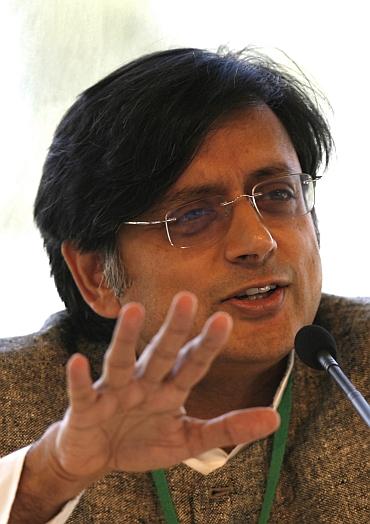 Shashi Tharoor, the minister of state for human resources development, the moderator for a discussion on heritage and the diaspora, was suave as ever as he described how Indians had influenced the world and drawn the best of foreign influences.
Shashi Tharoor, the minister of state for human resources development, the moderator for a discussion on heritage and the diaspora, was suave as ever as he described how Indians had influenced the world and drawn the best of foreign influences.
"I couldn't asked for a larger and wider and more representative panel to showcase the sheer diversity of the Indian diaspora, and issues surrounding the Indian diaspora," he said, in the latter case alluding to role played by speakers not of Indian origin, such as Abike Dabiri Erebe, chair of the Nigerian House of Representatives' Committee on Media and Publicity, and Jason Kenney, the Canadian minister of citizenship, immigration and multiculturalism.
"The cultural continuity of this civilisation, its resilience in the face of foreign invasions, and its capacity to absorb foreign influences, has few parallels in world history. The same resilience is evident in the experience of our diaspora. Wherever they have taken more than a bit of India with them, in both tangible and intangible ways," he said, before quoting Rajkeswur Purryag, the president of Mauritius, who earlier in the day said 'You take the Indian out of India but not India out of the Indian.'
A Malayali himself, he told the joke about Neil Armstrong finding a Malayali tea shop on the moon to underline the pervasiveness of the community's influence and the extent of its reach.
Tharoor also cited one of his favorite statistics when he said that in the United Kingdom curry houses employ more people than the iron and steel and shipbuilding industries combined, and said it showed how the empire can strike back.
He said that despite some cultural and political faultlines -- for example, in South Africa, the Caribbean and Fiji -- but Indian assimilation in other cultures has been relatively friction free. Even the few conflicts that resulted had been largely resolved in a peaceful manner, he added.
Tharoor assured the audience that the combination of hard economic power with soft cultural influence is sure to make the 21century an Indian century in a very significant way.
Tharoor quoted Mahatma Gandhi's reference to letting the winds of the world go through his house before blowing him away to say that while Indians were open to new ideas they were not likely to be swept away by them ('We know in India how to drink Coca Cola without becoming Cocacolonised').
Sir Anand Satyananand, the former governor of New Zealand, assured the gathering that Indian culture was alive and well in his country. He quoted Gandhi's assertion that a nation's culture lived in the hearts and soul of its people.
"When the people of India have traveled so widely around the world, it is inevitable that that list (of variations in culture) is always growing and changing," he said.
He said his perception of India was shaped through his family ad friends. That view was modified by the professional and personal relationships with Indians across the world.
"India's heritage is not something that remains in the past. We create the heritage of tomorrow today," he said.
When he came up, Jason Kenney spoke of Canada's 'fetish for diversity' and, while describing his ties with the Indian community, described how a Malayali family had stayed at his home for a year and left the fragrance of coconut oil behind.
Dr S Subramaniam, Malaysia's minister of human resources, described how Indian culture, particularly the Tamil kind, had influenced the fabric of life in East Asia. He described the various immigrations from India, and their lingering legacy in the hundreds of archaeological sites, many Indian language media outlets, the thousands of temples, and more.
He said Malaysia sought unity in diversity, relying more on a philosophy of acceptance than one of assimilation.
Pawan Verma, the UK's parliamentary undersecretary of state, said India's heritage -- one he described as 'audacious' -- was distinguished by its power of original thought. He cited the Natyashastra as an example and spoke of how Islamic invaders and proselytisers had been influenced by and finally left their mark on Indian culture.
He also spoke of Shankaracharya's dissent and debate that finally to an exchange with Buddhism.
Erewe spoke of the Nigerian experience, and joked that if she were offered Indian citizenship she would take it.
She spoke of the longevity of cultural influence by saying that no matter how far a river went, its source did not change. But Erewe also pointed out to the 'subtle duality' members of the diaspora faced in not knowing quite where they were from.







